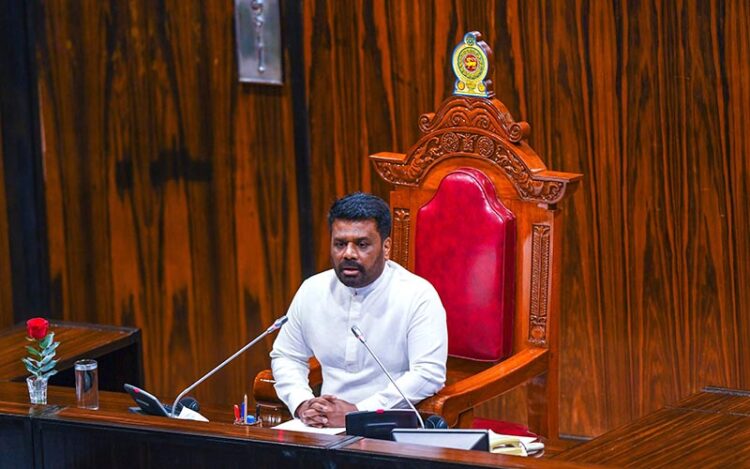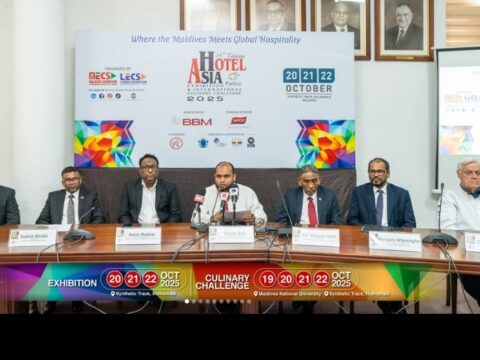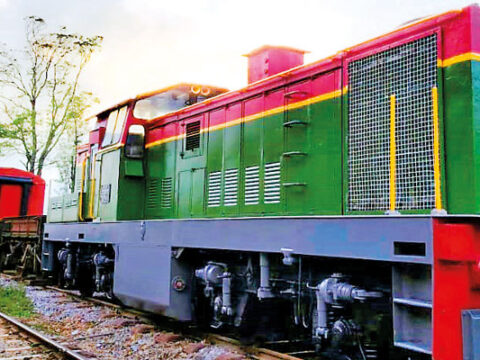COLOMBO: In a historic speech at the inauguration of Sri Lanka’s 10th Parliament on November 21, President Anura Kumara Dissanayake outlined his government’s bold vision to reshape the nation’s future. The speech marked a turning point in Sri Lanka’s governance, as the President pledged to address the country’s most pressing challenges with transparency, inclusivity, and accountability. President Dissanayake’s wide-ranging address reflected his vision for a united, just, and prosperous Sri Lanka. From restoring faith in democracy and the rule of law to stabilizing the economy and fostering national harmony, his speech laid out a roadmap for transformative change.
A Historic Mandate and Political Transformation
Dissanayake began by highlighting the significance of the recent Presidential and General Elections, calling them a “monumental moment” in Sri Lanka’s parliamentary history. He noted that the current Parliament features the highest number of representatives elected under a singular mandate, reflecting a profound shift in political power.
“This mandate is a comprehensive one,” the President declared, underscoring the quantitative and qualitative transformation in governance. He expressed deep gratitude to citizens from across all provinces and communities who placed their trust in his leadership, while also respecting the contributions of those who supported other political movements.
Rejecting Racism and Embracing National Unity
Taking a firm stance against divisive ideologies, Dissanayake condemned the role of racism and religious extremism in shaping Sri Lanka’s political landscape over the decades. “When racism becomes the cornerstone of a political ideology, the unavoidable outcome is the emergence of counter-racism,” he said, emphasizing that such dynamics have no place in the nation’s future.
He pledged to build a nation free from ethnic and religious divisions, ensuring a united and harmonious society for future generations. The President also reaffirmed his commitment to multi-party democracy, stating, “Democracy is not about uniting all people under a single party or a single ideology but about the coexistence of diverse political ideologies and groups.”
Restoring the Dignity of Parliament
Acknowledging the erosion of public trust in Parliament over the past two decades, Dissanayake called for a complete overhaul of its culture. “What was once a revered institution has now become an object of public distrust, hostility, and contempt,” he lamented.
He pledged to restore the dignity of Parliament by ensuring transparency, accountability, and public scrutiny of its proceedings. “This Parliament will no longer remain a hidden chamber concealed from the public,” he said, urging all Members of Parliament to work collaboratively to regain the trust and respect of the people.
Strengthening Justice and the Rule of Law
Dissanayake reaffirmed his government’s commitment to justice and the rule of law, acknowledging the public’s loss of faith in the legal system. “People no longer believe that they can obtain justice by seeking redress through the legal system,” he said, warning that failure to address corruption, fraud, and controversial crimes would shatter public dreams of fairness.
The President vowed to deliver justice to victims and hold perpetrators accountable, promising to rebuild a nation where law, justice, and fairness prevail.
Tackling Economic Challenges with Precision
Addressing the severe economic crisis gripping Sri Lanka, Dissanayake outlined a strategic plan for stabilization and growth. He revealed that ongoing discussions with the International Monetary Fund (IMF) were nearing a critical milestone, with the third review of the program expected to be finalized soon.
“This economic crisis has left us with no room for errors,” he admitted, emphasizing the importance of careful analysis and well-informed decision-making. He announced a three-pillar economic strategy focused on rapid growth, public participation, and equitable wealth distribution, warning against wealth concentration, which he said would destabilize both society and the economy.
Key Sectors for Rapid Development
The President identified several sectors as key drivers of economic growth. Tourism took center stage, with ambitious targets of attracting 4 million tourists and generating $8 billion annually within the next 3 to 4 years. “Tourism is an area where we can achieve rapid growth,” he affirmed.
The IT sector also featured prominently in his address, with plans to expand the number of IT professionals from 85,000 to 200,000 within five years and increase export earnings from $1.2 billion to $5 billion. Additionally, digitalization, science, and technology were highlighted as pivotal areas for building a $15 billion digital economy.
The President also pledged to modernize agriculture, enhance seed research, and target export markets while ensuring the welfare of farmers. Fishing and mineral resource development were identified as other critical areas for long-term sustainability, with plans to maximize their potential and develop value-added industries.
A Vision for “Clean Sri Lanka”
In an effort to promote civic responsibility, Dissanayake announced the launch of the “Clean Sri Lanka” initiative, aimed at fostering a transformation in societal attitudes. The program will encourage citizens to respect public property, adopt responsible behaviors, and cultivate compassion and empathy.The President also acknowledged the hardships faced by rural women due to inadequate sanitation facilities, promising targeted improvements to address their needs
“This society needs revival,” he stated, urging citizens to cultivate kindness and understanding as the foundation for a harmonious future. “We need a community that smiles—a society where people look at one another with kindness and compassion,” he said.
Eradicating Poverty and Ensuring Social Welfare
Poverty eradication emerged as a central theme in the President’s address. He outlined plans to increase welfare allowances, boost pensions, and raise public sector wages in the upcoming budget. Measures to combat child malnutrition, provide targeted allowances to families, and ensure pregnant mothers receive nutritious meals were also announced.
While emphasizing immediate relief for vulnerable groups, Dissanayake stressed the importance of long-term solutions to reduce reliance on welfare. “Our ultimate goal is to create an economy where every citizen has the opportunity to participate productively,” he said, underscoring the potential for progress and renewal, and offering hope for a brighter future for all its citizens.




